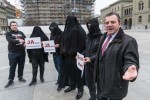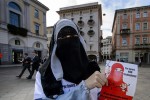Not to be outdone by Egypt’s Shaykh Tantawi, the Muslim Canadian Congress (MCC) released a statement two weeks ago that calls for the Canadian government “to introduce legislation to ban the wearing of masks, niqabs and the burka in public.” Their rationale for this statement seems twofold: one one hand, the MCC is concerned that “the wearing of a face-mask [is] a security hazard and has led to a number of bank heists in Canada and overseas,” and on the other, they argue that the “burka or niqab are political symbols of Saudi inspired Islamic extremism.” They also maintain that the burqa and niqab are not required in Islam, which, they argue, means that ideas of “religious freedom” are not applicable to this context.
For anyone unfamiliar with the MCC, we’ve discussed the organization (and its founder, Tarek Fatah) briefly in a few previous MMW articles, as well as a couple pieces on Muslim Lookout. The short version of the story is that this organization, and its members, tends to have a certain political strategy that consists of painting the majority of Muslims as dangerous fundamentalists. Although named the Muslim Canadian Congress, they represent only a tiny minority of Canadian Muslims; of all of the range of Muslims that I know in Canada, no one I know supports the MCC in any way. I realize that that fact has no statistical significance, but, at risk of being labeled an “Islamist” for disagreeing with the MCC, I think it’s important to be clear that they have very little credibility among Canada’s Muslims, regardless of religiosity or political leaning.
In most of the media articles about the recent statement, this lack of credibility and of community support does not come through at all; headlines range from “Canadian Muslim group calls for burka ban” to the stronger “Canadian Muslims seek ban on public wearing of burka,” implying that the sentiment is far more widespread among “Canadian Muslims” than it probably is. (It may also suggest that any Muslims who disagree with a government ban are the real scary fundamentalists.) Incidentally, there was no media coverage of the subsequent statement released by a wide coalition of Muslim organizations, including the Canadian Council on American-Islamic Relations and the Canadian chapter of the Islamic Society of North America, opposing the calls to ban the burqa and niqab.
Although I personally disagree with the proposed niqab/burqa ban (and, for the record, I also personally disagree with the perspective that they are religious obligations), that’s not the point of this post. What I think is more interesting, from a media analysis point of view, are the ways that Muslim women’s bodies are used to make political statements. Since that issue is not exactly a new one for MMW posts, I specifically want to look at the MCC call for a ban in terms of the ways that discourses of public security are being manipulated to paint certain Muslim women as a threat to the nation.
Let’s go back to the quote from the statement that argues that wearing a face covering is a “security hazard and has led to a number of bank heists in Canada and overseas.” MCC founder Tarek Fatah elaborates in an opinion piece published by the National Post, explaining that:
a person wearing a burka and masquerading as a Muslim woman robbed a ScotiaBank branch in Mississauga and is still being hunted by police. Interestingly, none of the national newspapers covered the burka-bandit bank holdup, scared it seems that reporting the incident would attract accusations of racism and Islamophobia.


